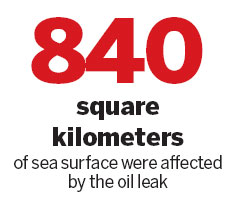Oil firm stands by leak response
Updated: 2011-07-07 07:32
By Zhou Yan and Zhao Ruixue (China Daily)
|
|||||||||||
BEIJING - US energy giant ConocoPhillips on Wednesday defended its response to a pair of oil leaks off China's northeast coast, saying it acted quickly to contain the damage and pointing out that the cleanup work was almost finished.
The remarks were in response to an announcement from China's State Oceanic Administration on Tuesday that it was investigating the company's role in last month's spills and assessing possible damage to the environment.
Storaker said at a news conference that the volume released was "dramatically lower".
Unlike the Gulf of Mexico oil well blowout, the Penglai oilfield leak didn't cause any injuries, he told reporters. He also said the spill is not ongoing.
"There are clean-up activities taking place The cause of the incidents are currently under investigation," Storaker said, without giving a specific timetable for the release of results.

The Houston-based company did not disclose the clean-up cost nor talk about possible compensation payments.
The State Oceanic Administration said on Monday that the oil leak affected more than 840 square kilometers of Bohai Bay. It said about 70 cubic meters of oil and water was collected during the clean-up.
ConocoPhillips, which owns a 49 percent stake in the oilfield, said it notified the authorities and its partner, the China National Offshore Oil Corp (CNOOC) Ltd, immediately after the incidents. Both companies shrugged off questions about whether they notified the public promptly after the oil spill.
Hong Kong-listed CNOOC, China's biggest offshore oil producer by capacity, holds a 51 percent stake in the Penglai 19-3 oilfield.
The Shandong provincial oceanic and fishery department did not receive any information about the oil leak until late June and started monitoring the area after that, according to an official from the department who declined to be named.
"It's difficult to detect the real pollution situation based on the samples that were collected quite a long while after the oil spill," the source said.
Shandong is one of the areas closely looking at the leak.
The department and Shandong's finance bureau last year jointly released interim measures on compensation for marine ecosystem damage and losses, the first such rules in China.
Under the stipulation, 10 million yuan ($1.55 million) of compensation can be claimed from polluters if ecological damage to the sea covers 50 hectares. Compensation can climb to 200 million yuan for 1,000 hectares of affected area.
The source said that if Shandong detects any pollution within the province as a result of the oil spill, it will seek compensation based on the new rules.
ConocoPhillips said the first event, "a sheen associated with a slow, intermittent seep", was observed on June 4 near Platform B. Another leak was discovered on June 17 near Platform C.
It said that, in both instances, the company quickly reported the leaks to the Chinese authorities and deployed equipment and staff to clean up the spills.
"We haven't monitored any contamination in inshore waters, such as bathing beaches, marine culture areas, and sea resorts, " Cui Wenlin, director of the North China Sea Environmental Monitoring Center of the State Oceanic Administration, told China Daily.
He added that a small-scale oil spill may not cause massive damage to the environment but noted that it was still too soon to say whether the leaks in Bohai Bay were small or not.
"We're monitoring the environment every day," Cui said.
ConocoPhillips made it clear that it is responsible for exploration, development and production in the oilfield and is therefore responsible for handling emergencies, ensuring CNOOC is not held accountable.
"The compensation is still under assessment and we'll act in accordance with the contracts we signed with ConocoPhillips," said Chen Bi, executive vice-president of CNOOC.
He also stressed that his company had never hidden any oil spill incident from the public.
Both ConocoPhillips and CNOOC extended their apologies and regrets for the incidents at the press briefing.
"Any spill of oil in the water is too much," said Storaker.




